Soccer is the most popular sport in Germany. The first football club, the Dresden English Football Club, was founded in Germany in 1874 by Englishmen living in Germany. For 20 years the sport became progressively popular, but during and after the World War, soccer remained dormant in Germany for a long time. Since 1908, the German National Football team has represented the country in international events. The German National Football Association, known as Deutscher Fußball-Bund or DFB in German, is the national governing body of soccer and comprises 6.6 million members, and that translates into about 8% of the total population. Currently, Germany is one of the foremost soccer-playing nations. The German national football team has won three world cups, including the world cups of 1954, 1974 and 1990. It has also won a record three times in the UEFA European Championships in 1972, 1980 and 1996.
1. Friedrich Walter

Friedrich Walter, commonly known as Fritz Walter, was born on October 31, 1920 in Kaiserslautern, Germany and died on June 17, 2002, at the age of 81 years in Enkenbach-Alsenborn, Germany. He joined Kaiserslautern youth academy in 1928 and debuted with the German national team in 1940. Playing under Sepp Herberger, he scored a hat trick against Romania in his very first professional game. He was the captain of the 1954 world cup winning team. His brother Ottmar Walter was also the part of the winning team. In 1985, the home stadium of FC Kaiserslautern was named Fritz-Walter-Stadion in his honor. On June 17, 2006 the USA played against Italy in Kaiserslautern and a minute’s silence was observed in his memory. In November 2003, the German Football Association selected him as the Golden Player of the 50 years from 1954 to 2003.
2. Franz Anton Beckenbauer
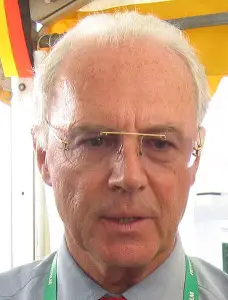
Franz Anton Beckenbauer, nicknamed Der Kaiser, meaning The Emperor, was born on September 11, 1945 in Munich; Germany. He is five feet eleven inches tall. He is considered the greatest German Soccer player of all times and one of the most famous soccer players in history. Twice, he had been selected as the European Footballer of the Year. He represented West Germany 103 times and participated in three world cups. He is one of the two players who participated in a World Cup game, both as a player and as a coach, and he is the only player to win the World Cup as a captain and as a coach. He won the World Cup in 1974 as a captain and in 1990 as a manager. He has also been elected to the National Soccer Hall of Fame.
3. Jurgen Klinsmann
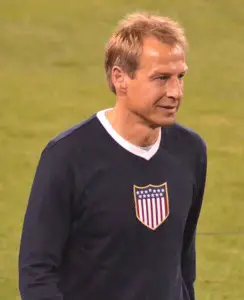
Jurgen Klinsmann was born on July 30, 1964 in Goppingen, West Germany. He is five feet eleven inches tall. He was a player of the 1990 FIFA World Cup-winning West German team. He was also part of the team that won the 1996 UEFA European Championship. In 1990, he scored in each of the six major international tournaments in which he participated. After the retirement of Ottmar Hitzfeld in July 2008, he started coaching the Bundesliga club Bayern in Munich. The US Soccer Federation named him the coach of USMNT, The United States Men’s National Soccer Team, on July 29, 2011.
4. Gerhard Muller

Gerhard Muller is nicknamed der Bomber, the bomber, because of his prolific goal scoring. He was born on November 3, 1945 in Nördlingen, Germany. He is five feet nine and a half inches tall. He is one of the most productive scorers of all time and as such ranks number 10. He holds the record of 68 goals in 62 international games. He scored 365 goals in 427 in Bundesliga or league games. He has also scored 66 goals in 74 European club games. He was elected European Footballer of the Year in 1970. Following a fruitful season at Bayem Munich and having scored 10 goals at the 1970 World Cup, he was elected the European Footballer of the Year.
5. Josef Dieter Maier

Josef Dieter Maier was born on February 28, 1944. For his extraordinarily quick reflexes, he was nicknamed Die Katze von Anzing, meaning the cat from Anzing. He is a legendary goal keeper. He won three European Cups consecutively, which is the German record. He played in 442 league matches. He represented Germany four times in the soccer World Cup. He attained the height of his professional career in the 1974 FIFA World Cup, played on home soil, when Germany defeated the Netherlands team in Maier’s hometown, Munich. He worked for Bayern as head goalkeeping coach and retired in 2008. He was honored with the Life Achievement Award by the Bavarian Government in 2008.
6. Lothar Herbert Matthaus

Lothar Herbert Matthaus was born on March 21, 1961 in Erlangen, West Germany. He is five feet eight and half inches tall. He is a former soccer player and manager. He was the captain of the 1990 FIFA World Cup-winning German team. He was named the World Soccer Player of the Year and European Footballer of the Year. In 1991, he was named the first FIFA World Player of the Year. He has played five World Cups over the years: 1982, 1986, 1990, 1994 and 1998. He was named German Footballer of the Year for the second time in 1999. He is on the list of FIFA100. Diego Maradona wrote about Matthaus in his book Yo soy el Diego, I am Diego: ‘He is the best rival I’ve ever had. I guess that’s enough to define him.”
7. Rene Adler

Rene Adler was born on January 15, 1985 in Leipzig, East Germany. He is six feet three inches tall. He started playing soccer at the early age of six years and rose to shining star in under-19 championships. He played as a goal keeper in the German league and national teams. He debuted on February 25, 2007 playing for Bayer o4 Leverkusen against Schalke o4. He repelled attacks of Schalke’s repeatedly and Leverkusen made a 1-0 upset. Leverkusen’s manager Michael Skibbe commented on his performance ‘world-class saves.’ On October 11, 2008, in his international debut, he played against Russia, making his place on the World Cup team. Although he was confirmed as the team’s main goal keeper, he could not play in the World Cup because of a rib injury.
8. Markus Babbel
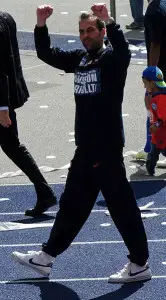
Markus Babbel was born on September 8, 1972 in Munich. He is a former soccer player and coach of international fame. He played for Germany as a defender. He played for Liverpool but, suffering from a temporary paralysis, he was constrained to refrain from playing for one year. He resumed with the Blackburn Rovers after his recovery. He had won the UEFA cup twice, first in 1996 playing for Bayern and the second while playing for Liverpool. He represented Germany in the 1998 FIFA World Cup and Euro 2000.
9. Mario Basler
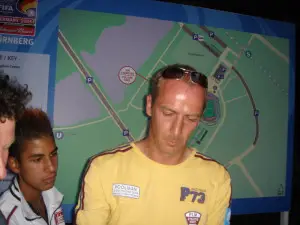
Mario Basler was born on December 18, 1968 in Neustadt, West Germany. He is six feet one inch tall. In 1995, he was the top scorer of the Bundesliga. He was a member of the Euro 1996 winning national team of Germany. He was best known as the dead ball specialist and had scored many goals from free kicks. He also scored two direct goals from corner kicks. In the 1999 UEFA Championship League Final, he scored the opening goal against Manchester United, at Camp Nou in Barcelona. From 1994 to 1998, Basler played 30 games for the Germany National Football team. He was also named in the 1994 World Cup squad and Euro 1996.
10. Oliver Rolf Kahn
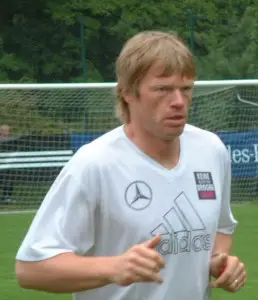
Oliver Rolf Kahn was born on June 15, 1969 in Karlsruhe, West Germany. He is a former German goal keeper. He started playing for the Karlsruher SC Junior team in 1975 and was later on transferred to Bayern Munich, for which he played until the end of his professional career in 2008. Kahn is one of the most successful German players in modern times. His achievements include eight German championships, the 1996 UEFA cup, UEFA Champion League, six German cups, and the Intercontinental Cup. He won four Best European Goalkeeper awards and two German Footballer of the Year trophies. He won the Golden Ball at the 2002 FIFA World Cup.
Conclusion
Soccer requires lot of physical power, excellent physical fitness, agility, and commitment to the unity of purpose to achieve the goal. This in turn requires excellent coordination among the players, coherence in the team and, above all, spotless team spirit. It is not only the energy, but rather the synergy and symbiosis of the players that makes the winning soccer teams. The German Women’s national football team is also terrific in performance and has won two FIFA women’s world cups in 2003 and 2007, as well as a record eight UEFA European Women’s Championships wins.




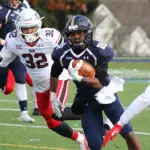





Leave a Reply